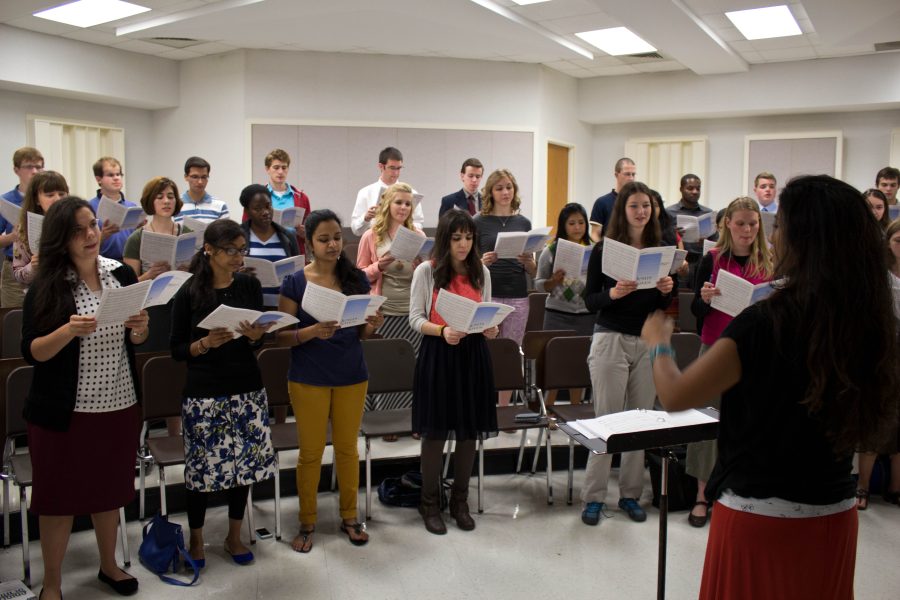Missionaries sometimes seem like distant friends that we support from afar, but next week BJU will bring missionaries and their respective mission fields front and center for Missions Emphasis Week. Students will be able to hear about missions from around the world and possibly even find their own God-given mission.
“BJU has more students than ever who say they’re open to missions,” said Mark Vowels, director of missions at BJU. And now those interested students have the chance to put that willingness into action. The Riley Room will be filled with nearly 55 different mission organizations Tuesday through Thursday, and each of these organizations will have representatives eager to talk with students about what God is doing and how they can get involved.
This large group of organizations shows the diversity of modern missions. More missions opportunities exist than ever, and not just in the sense of how people have traditionally thought of missions. Vowels explained that missions work has seen a change over the last few years. In the past, the model for practicing missions went something like this: you pursued an education in missions, selected a country in which to start a church and then traveled around from church to church, attempting to raise sufficient funds for your work.
In recent years, however, this model has encountered some issues. One obstacle has been the difficult economic conditions faced by much of the world. Missionaries have had trouble raising the necessary funds. Another obstacle is that many countries will not allow Christians to enter for the sole purpose of being missionaries. Christians must now prove they will contribute some other service to a country other than simply proselytizing.
Vowels does not think these new challenges are all negative; he thinks they may provide a way for a new generation of Christians to share the gospel. Rather than going to a country solely to start a church, Christians now have many avenues to share their faith. One example Vowels gave was of a man in North Africa who uses soccer to build relationships with young people. Other examples include being a culinary arts major who opens a restaurant in Vietnam and shares his faith with his customers, or being a business major who opens a business in India and helps a local church with its finances.
Vowels said this type of operation has a dual benefit: one, if you have a way to generate money, you’re not dependent solely on a church for financial support, and two, with a business, for example, you have a great way to build relationships in your community. There’s certainly still a place for traditional missions, but this new type of integrated missions that is emerging gives opportunities that may not have been possible before.
Jon Fremont, a senior cross-cultural service major, is looking to use this new missions strategy when he graduates. Although he’s not sure what his mission field will be, Fremont hopes to join with a team and use his teaching skills as an avenue into foreign countries. Fremont thinks that BJU’s curriculum equips all students to be excellent missionaries.
“At [BJU] you graduate with more Bible knowledge than most of the world has,” Fremont said. “Even if you’re not a missions major, it’s staggering how much Bible knowledge you have simply because of the Bible classes you’re required to take. I think people with majors besides cross-cultural service can make just as good if not better missionaries.”
But the old way and the new way can also work together. Vowels said he would love to see students who are studying missions team up with students from other majors and enter the field together. Perhaps a business major and a cross-cultural service major can combine forces, with one operating a business while the other focuses on establishing relationships in the community.
But the first step is deciding where God would have you to serve, and that’s where Missions Emphasis Week comes in.
Two BJU graduates, Jay Cross, on deputation to go to Peru, and Jon Crocker, a missionary to Mexico, will share from God’s Word in chapel. Both speakers are younger men who, along with their families, have a great burden to reach Spanish speakers with the gospel.
Students interested in missions or who just want to hear about what God is doing around the globe should visit the Riley Reception Room 11:45 a.m. to 8 p.m. Tuesday, 9 a.m. to 5 p.m. Wednesday or 9 a.m. to 8 p.m. Thursday.
Rather than asking for basic information about the ministry, Vowels encourages students to approach with this request: “Tell me a story.” It’s through hearing about God’s powerful work in different ministries that Vowels believes students will really have their eyes opened to the vision of missions and perhaps they will see God using their own lives in a similar way.





















































